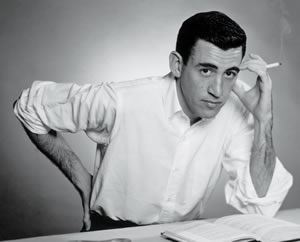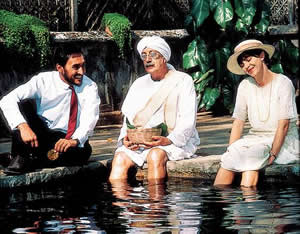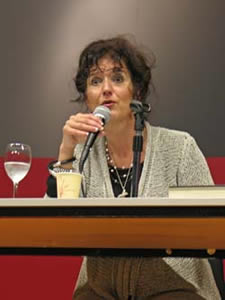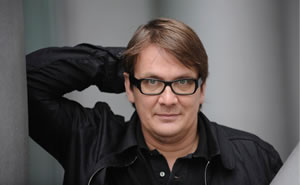De Amerikaanse schrijver Jerome David Salinger werd in New York geboren op 1 januari 1919. Zie ook alle tags voor J. D. Salinger op dit blog.
Uit: The Catcher in the Rye
“I didn’t say anything for about a minute. Then I said, “All right. What do they do, the fish and all, when that whole little lake’s a solid block of ice, people skating on it and all?”
Old Horwitz turned around again. “What the hellaya mean what do they do?” he yelled at me. “They stay right where they are, for Chrissake.”
“They can’t just ignore the ice. They can’t just ignore it.”
“Who’s ignoring it? Nobody’s ignoring it!” Horwitz said. He got so damn excited and all, I was afraid he was going to drive the cab right into a lamppost or something. “They live right in the goddam ice. It’s their nature, for Chrissake. They get frozen right in one position for the whole winter.”
“Yeah? What do they eat, then? I mean if they’re frozen solid, they can’t swim around looking for food and all.”
“Their bodies, for Chrissake–what’sa matter with ya? Their bodies take in nutrition and all, right through the goddam seaweed and crap that’s in the ice. They got their pores open the whole time. That’s their nature, for Chrissake. See what I mean?” He turned way the hell around again to look at me.
“Oh,” I said. I let it drop. I was afraid he was going to crack the damn taxi up or something. Besides, he was such a touchy guy, it wasn’t any pleasure discussing anything with him. “Would you care to stop off and have a drink with me somewhere?” I said.
He didn’t answer me, though. I guess he was still thinking. I asked him again, though. He was a pretty good guy. Quite amusing and all.
“I ain’t got no time for no liquor, bud,” he said. “How the hell old are you, anyways? Why ain’tcha home in bed?”

J.D. Salinger (1 januari 1919 – 27 januari 2010)
De Engelse romanschrijver en essayist Edward Morgan Forster werd geboren op 1 januari 1879 in Londen. Zie ook alle tags voor Edward Morgan Forster op dit blog.
Uit: A Passage to India
“The sky too has its changes, but they are less marked than those of the vegetation and the river. Clouds map it up at times, but it is normally a dome of blending tints, and the main tint blue. By day the blue will pale down into white where it touches the white of the land, after sunset it has a new circumference –
orange, melting upwards into tenderest purple. But the core of blue persists, and so it is by night. Then the stars hang like lamps from the immense vault. The distance between the earth and them is as nothing to the distance behind them; and that further distance, though beyond colour, last freed itself from blue.
The sky settles everything – not only climates and seasons, but when the earth shall be beautiful. By herself she can do little – only feeble outbursts of flowers. But when the sky chooses, glory can rain into the Chandrapore bazaars, or a benediction pass from horizon to horizon. The sky can do this because it is so strong and so enormous. Strength comes from the sun, infused in it daily, size from the prostrate earth. No mountains infringe on the curve. League after league the earth lies flat, heaves a little, is flat again. Only in the south, where a group of fists and fingers are thrust up through the soil, is the endless expanse interrupted. These fists and fingers are the Marabar Hills, containing the extraordinary caves.”

Edward Morgan Forster (1 januari 1879 – 7 juni 1970)
Scene uit de film van David Lean uit 1984 met Victor Banerjee, Judy Davis en Alec Guiness
De Amerikaanse schrijver Douglas Kennedy werd geboren op 1 januari 1955 in New York. Zie ook alle tags voor Douglas Kennedy op dit blog
Uit: Temptation
“I AL WAYS WANTED to be rich. I know that probably sounds crass, but it’s the truth. A true confession.
Around a year ago, I got my wish. After a ten-year bad luck streak—a toxic accumulation of endless rejection slips and “we’re going to pass on this” and the usual bevy of near-misses (“you know, we were really looking for this sort of thing last month”), and (of course) never getting my calls returned—the gods of happenstance finally decided I was worth a smile. And I received a phone call. Check that: I received the phone call that anyone who has ever scribbled for a living always dreams of receiving.
The call came from Alison Ellroy, my long-suffering agent.
“David, I sold it.”
My heart skipped five beats. I hadn’t heard the words “I sold it” for . . . well, to be honest about it, I’d never heard that sentence before.
“You sold what?” I asked, since five of my speculative scripts were currently doing the Flying Dutchman rounds of assorted studios and production companies.
“The pilot,” she said.
“The television pilot?”
“Yep. I sold Selling You.”
“To whom?”
“FRT.”
“What?”
“FRT—as in Front Row Television; as in the smartest, hottest producer of original programs on cable .”

Douglas Kennedy (New York, 1 januari 1955)
De Nederlandse schrijfster Rascha Peper (pseudoniem van Jenneke Strijland) werd geboren op 1 januari 1949 in Driebergen. Zie ook alle tags voor Rascha Peper op dit blog.
Uit: Zwartwaterkoorts
“De mozambieksijzen maakten al sinds gisteren een hangerige indruk en ook de Indische tortels vertrouwde hij niet helemaal. Bovendien bleek, zodra hij met Scheffer op de schouder de deur van de zijkamer opende, de manke merel in gevecht met de blinde. Scheffer dook erop omde orde te herstellen, maar Stutijns beslissing stond meteen vast: de manke merel kon weer teruggezet worden; dit was al de derde keer dat hij zich agressief tegen de blinde gedroeg.
Terwijl Scheffer met opgezette borstveren door de kamer hipte om zich door de tortels te laten bewonderen, verzamelde Stutijn de drinkbakken en gooide ze leeg in de wastafel. Bij het vullen kwam Scheffer op de kraan zitten omuit de waterstraal te drinken, terwijl de enig overgebleven rode kardinaal schuin boven hemaan de waterleidingbuis hing om direct zijn plaats in te kunnen nemen als Scheffer klaar was. Zo was hier de pikorde.
Argwanend bekeek Stutijn de witkuifgaai, die met verdraaide hals boven op een nestkastje zat. Wat viel er te slapen, terwijl de zon hoog aan de hemel stond? Hij hing de schone drinkbakken op, vulde de voerbakjes bij, sneed een appel in stukjes, schudde een laatste restje buffalowormen uit en greep in het voorbijgaan de manke merel omhemin een kooitje te stoppen – dat ging gemakkelijk, in drie maanden tijds was het beestje handtam ge worden.
Begin april had hij de horren al in de vensters van de kamer geplaatst, dus het rook hier nu fris, en ook op de gang. ’s Winters merkte hij zelf wat voor muffe lucht er in de kamer hing, hoe wel hij soms wel twee keer in de week de poep van de vloer schraapte, zelfs van de boomtakken die tussen vloer en plafond geklemd stonden. Die takken zouden eens ververst moeten worden, maar bij de gedachte alleen al zonk hem de moed in de schoenen.”

Rascha Peper (Driebergen, 1 januari 1949)
De Duitse schrijver en musicus Sven Regener werd geboren op 1 januari 1961 in Bremen. Zie alle tags voor Sven Regener op dit blog.
Uit: Der Hund
“Der Nachthimmel, der ganz frei von Wolken war, wies in der Ferne, über Ostberlin, schon einen hellen Schimmer auf, als Frank Lehmann, den sie neuerdings nur noch Herr Lehmann nannten, weil sich herumgesprochen hatte, daß er bald dreißig Jahre alt werden würde, quer über den Lausitzer Platz nach Hause ging. Er war müde und abgestumpft, er kam von der Arbeit im Einfall, einer Kneipe in der Wiener Straße, und es war spät geworden. Das war kein guter Abend, dachte Herr Lehmann, als er von der westlichen Seite her den Lausitzer Platz betrat, mit Erwin zu arbeiten macht keinen Spaß, dachte er, Erwin ist ein Idiot, alle Kneipenbesitzer sind Idioten, dachte Herr Lehmann, als er an der großen, den ganzen Platz beherrschenden Kirche vorbeikam. Ich hätte die Schnäpse nicht trinken sollen, dachte Herr Lehmann, Erwin hin, Erwin her, ich hätte sie nicht trinken sollen, dachte er, als sich sein Blick zerstreut in den Maschen der hohen Umzäunung des Bolzplatzes verfing. Er ging nicht schnell, die Beine waren ihm schwer von der Arbeit und vom Alkohol. Das mit dem Schnaps war Quatsch, dachte Herr Lehmann, Tequila und Fernet, morgen früh wird es mir schlecht gehen, dachte er, Arbeiten und Schnapstrinken verträgt sich nicht, alles, was über Bier hinausgeht, ist falsch, dachte er, und gerade ein Typ wie Erwin sollte seine Angestellten nicht noch zum Schnapstrinken überreden, dachte Herr Lehmann. Er kommt sich noch großzügig dabei vor, wenn er die Leute zum Schnapstrinken überredet, dachte Herr Lehmann, dabei tut er das bloß, um selbst einen Vorwand zum Saufen zu haben, aber andererseits, dachte er, ist es auch nicht richtig, die Verantwortung auf Erwin abzuwälzen, am Ende ist man immer selber schuld, wenn man Schnaps trinkt.”

Sven Regener (Bremen, 1 januari 1961)
Zie voor nog meer schrijvers van de 1e januari ook mijn vorige blog van vandaag.
